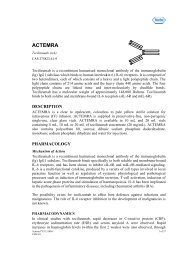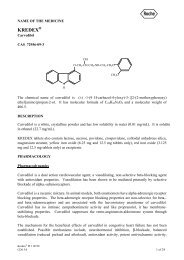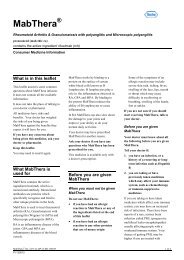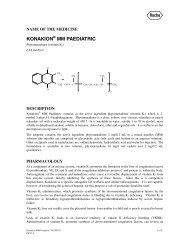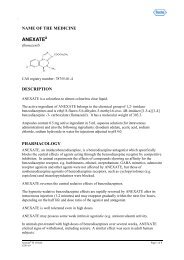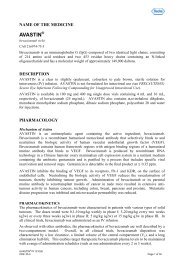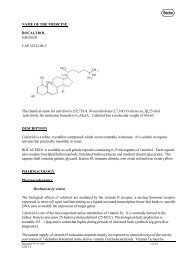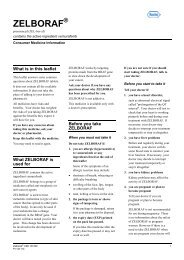Actemra (tocilizumab) - Consumer Medicine ... - Roche Australia
Actemra (tocilizumab) - Consumer Medicine ... - Roche Australia
Actemra (tocilizumab) - Consumer Medicine ... - Roche Australia
Create successful ePaper yourself
Turn your PDF publications into a flip-book with our unique Google optimized e-Paper software.
ACTEMRA ®<br />
pronounced (Act-tem-ra)<br />
contains the active ingredient <strong>tocilizumab</strong> (rch)<br />
<strong>Consumer</strong> <strong>Medicine</strong> Information<br />
What is in this leaflet<br />
This leaflet answers some common<br />
questions about ACTEMRA<br />
infusion.<br />
It does not contain all the available<br />
information.<br />
It does not take the place of talking to<br />
your doctor or pharmacist.<br />
All medicines have risks and<br />
benefits. Your doctor has weighed<br />
the risks of you taking ACTEMRA<br />
against the benefits they expect it<br />
will have for you.<br />
If you have any concerns about<br />
taking this medicine, ask your<br />
doctor or pharmacist.<br />
Keep this leaflet with the medicine.<br />
You may need to read it again.<br />
What ACTEMRA is<br />
used for<br />
ACTEMRA contains the active<br />
ingredient <strong>tocilizumab</strong>.<br />
ACTEMRA belongs to a group of<br />
medicines called anti-rheumatic<br />
agents. There are many different<br />
classes of anti-rheumatic agents.<br />
ACTEMRA belongs to a class called<br />
monoclonal antibodies.<br />
Monoclonal antibodies are proteins<br />
which specifically recognise and bind<br />
to other unique proteins in the body.<br />
ACTEMRA is used to treat active<br />
moderate to severe rheumatoid<br />
arthritis (RA).<br />
ACTEMRA is also used to treat<br />
active systemic juvenile idiopathic<br />
arthritis (sJIA) and active moderate<br />
to severe polyarticular juvenile<br />
idiopathic arthritis (pJIA) in children<br />
over 2 years of age.<br />
Some of the signs and symptoms of<br />
RA, pJIA and sJIA are caused by the<br />
actions of a protein called<br />
interleukin-6 receptor (IL-6R).<br />
For RA ACTEMRA can also prevent<br />
damage occurring to your joints and<br />
improve your ability to do your<br />
normal daily activities.<br />
ACTEMRA works by binding and<br />
blocking IL-6R thereby helping to<br />
relieve some of the signs and<br />
symptoms of RA, pJIA or sJIA.<br />
There are many different types of<br />
medicines used to treat RA, pJIA and<br />
sJIA. Your doctor, however, may<br />
have prescribed ACTEMRA for<br />
another purpose.<br />
Ask your doctor if you have any<br />
questions about why ACTEMRA<br />
has been prescribed for you.<br />
ACTEMRA is not addictive.<br />
This medicine is available only with<br />
a doctor's prescription. For pJIA and<br />
sJIA ACTEMRA should be<br />
prescribed by a doctor experienced in<br />
the management of these conditions.<br />
Before you are given<br />
ACTEMRA<br />
When you must not be given<br />
ACTEMRA<br />
Do not use ACTEMRA if:<br />
1. you have had an allergic<br />
reaction to ACTEMRA or any<br />
ingredients listed at the end of<br />
this leaflet<br />
Some of the symptoms of an<br />
allergic reaction may include:<br />
• shortness of breath<br />
• wheezing or difficulty breathing<br />
• swelling of the face, lips, tongue<br />
or other parts of the body<br />
• rash, itching or hives on the skin<br />
2. you have had an allergic<br />
reaction to any other<br />
recombinant human or<br />
humanised antibodies or<br />
proteins that are of hamster<br />
origin<br />
3. you have an active, severe<br />
infection<br />
4. the package is torn or shows<br />
signs of tampering<br />
5. the expiry date (EXP) printed<br />
on the pack has passed.<br />
If you take this medicine after the<br />
expiry date has passed, it may not<br />
work as well.<br />
If you are not sure if you should be<br />
given ACTEMRA, talk to your<br />
doctor.<br />
Before you are given<br />
ACTEMRA<br />
Tell your doctor if:<br />
1. you have or develop any kind of<br />
infection<br />
ACTEMRA can reduce your<br />
body's ability to respond to<br />
infections and may make an<br />
existing infection worse or<br />
increase the chance of getting a<br />
new infection. This may be<br />
important if you have diabetes or<br />
ACTEMRA ® 131009 1<br />
PI 131004
diverticulitis (which increase your<br />
risk of infection).<br />
Your doctor will perform blood<br />
tests before you are given<br />
ACTEMRA to determine if you<br />
have low white blood cell or<br />
platelet counts, or high liver<br />
enzymes.<br />
2. you have any other health<br />
problems, especially the<br />
following:<br />
• liver disease such as viral<br />
hepatitis<br />
• tuberculosis<br />
• diverticulitis or intestinal ulcers<br />
• a low white blood cell count or a<br />
low platelet count<br />
• diabetes<br />
• cancer<br />
• raised blood pressure<br />
• high cholesterol or triglycerides<br />
• kidney disease<br />
3. you have a history of<br />
macrophage activation<br />
syndrome (MAS)<br />
MAS is a complication of sJIA. If<br />
you have a history of MAS your<br />
doctor will decide if you can still<br />
be given ACTEMRA.<br />
4. you are planning to have a<br />
vaccination or have recently<br />
had a vaccination<br />
Certain types of vaccines should<br />
not be given while receiving<br />
ACTEMRA. It is particularly<br />
recommended that sJIA patients<br />
receive all necessary vaccinations<br />
prior to receiving ACTEMRA.<br />
5. you are pregnant or plan to<br />
become pregnant<br />
Tell your doctor if you are<br />
pregnant or plan to become<br />
pregnant. Women of childbearing<br />
potential should be advised to use<br />
adequate contraception during<br />
and for several months after<br />
treatment with ACTEMRA.<br />
ACTEMRA should not be used<br />
during pregnancy. However if<br />
there is a need to take<br />
ACTEMRA when you are<br />
pregnant your doctor will discuss<br />
the risks and benefits to you and<br />
the unborn baby.<br />
6. you are breast-feeding or plan<br />
to breast-feed<br />
It is not known whether<br />
ACTEMRA passes into breast<br />
milk. It is recommended that you<br />
discontinue breast-feeding while<br />
you are treated with ACTEMRA.<br />
7. you are on a controlled sodium<br />
diet<br />
ACTEMRA contains a small<br />
amount of sodium.<br />
8. you are allergic to any other<br />
medicines, foods, dyes or<br />
preservatives<br />
If you have not told your doctor<br />
about any of the above, tell him or<br />
her before you start taking<br />
ACTEMRA.<br />
Use in Children<br />
The safety and efficacy of<br />
ACTEMRA in patients below 18<br />
years of age with conditions other<br />
than pJIA or sJIA have not been<br />
established. There is only limited<br />
data available for ACTEMRA use in<br />
children with pJIA who are under 4<br />
years of age. The use of ACTEMRA<br />
in children under the age of 2 has not<br />
been studied.<br />
Taking other medicines<br />
Tell your doctor if you are taking<br />
any other medicines, including any<br />
that you have bought from a<br />
pharmacy, supermarket or health<br />
food shop.<br />
Do not use ACTEMRA with other<br />
biological medicines including<br />
infliximab, adalimumab, etanercept,<br />
anakinra, abatacept, rituximab,<br />
certolizumab pegol and golimumab.<br />
It is unknown how ACTEMRA<br />
interacts with these medicines.<br />
ACTEMRA may interfere with some<br />
medicines. These include:<br />
• warfarin, a medicine used to<br />
prevent blood clots<br />
• cyclosporin, a medicine used after<br />
organ transplants<br />
• atorvastatin and simvastatin,<br />
medicines used to reduce<br />
cholesterol levels<br />
• calcium channel blockers, such as<br />
amlodipine, which are used to<br />
treat raised blood pressure<br />
• theophylline, a medicine used to<br />
treat asthma<br />
• phenytoin, a medicine used to<br />
treat convulsions<br />
• benzodiazepines, such as<br />
diazepam, which are used to treat<br />
anxiety<br />
These medicines may be affected by<br />
ACTEMRA, or may affect how well<br />
the medicine works. You may need<br />
to use different amounts of your<br />
medicine, or you may need to take<br />
different medicines. Your doctor will<br />
advise you.<br />
Your doctor or pharmacist has more<br />
information on medicines to be<br />
careful with or avoid while taking<br />
ACTEMRA.<br />
Ask your doctor or pharmacist if<br />
you are not sure about this list of<br />
medicines.<br />
How ACTEMRA is<br />
given<br />
How ACTEMRA is given<br />
ACTEMRA is given by infusion into<br />
a vein (intravenous infusion) by a<br />
health care professional.<br />
The infusion usually takes one hour.<br />
For pJIA and sJIA ACTEMRA<br />
should be given in a hospital setting.<br />
For RA and pJIA ACTEMRA is<br />
usually given in combination with<br />
methotrexate (MTX). However you<br />
may receive ACTEMRA on its own<br />
if your doctor determines that initial<br />
treatment with MTX is inappropriate<br />
or unsuccessful.<br />
For sJIA ACTEMRA can be given<br />
on its own or in combination with<br />
MTX.<br />
ACTEMRA ® 131009 2<br />
PI 131004
How much is given<br />
For RA the normal dose of<br />
ACTEMRA is 8 mg per kilogram<br />
(kg) of your body weight. Your<br />
doctor will prescribe an amount of<br />
ACTEMRA that is right for you.<br />
For pJIA the normal dose of<br />
ACTEMRA is 8 mg per kg of your<br />
body weight if you weigh 30 kg or<br />
more, or 10 mg per kg of your body<br />
weight if you weigh less than 30 kg.<br />
Your doctor will prescribe amount of<br />
ACTEMRA that is right for you.<br />
For sJIA the normal dose of<br />
ACTEMRA is 8 mg per kg of your<br />
body weight if you weigh 30 kg or<br />
more, or 12 mg per kg of your body<br />
weight if you weigh less than 30 kg.<br />
Your doctor will prescribe an amount<br />
of ACTEMRA that is right for you.<br />
How long is ACTEMRA<br />
given<br />
For RA and pJIA you will be treated<br />
with ACTEMRA once every 4<br />
weeks. For sJIA you will be treated<br />
with ACTEMRA once every 2<br />
weeks.<br />
The number of infusions you will<br />
receive depends on how you are<br />
responding to treatment. Your doctor<br />
will discuss this with you.<br />
Continue receiving ACTEMRA<br />
until your doctor tells you to stop.<br />
If you miss a dose<br />
As ACTEMRA is given to you under<br />
the supervision of your doctor, you<br />
are unlikely to miss a dose. However,<br />
if you do then your doctor will<br />
decide when you should be given<br />
your next dose of ACTEMRA.<br />
Overdose<br />
As ACTEMRA is given to you under<br />
the supervision of your doctor it is<br />
unlikely that you will be given too<br />
much. However, if you experience<br />
any side effects after being given<br />
ACTEMRA, tell your doctor<br />
immediately.<br />
While you are<br />
receiving ACTEMRA<br />
Things you must do<br />
Tell your doctor immediately if<br />
you experience allergic reactions<br />
such as chest tightness, wheezing,<br />
severe dizziness or lightheadedness,<br />
swelling of the lips or<br />
skin rash during or after receiving<br />
ACTEMRA.<br />
Tell your doctor immediately if<br />
you develop an infection while you<br />
are being treated with ACTEMRA.<br />
Signs of serious infection include<br />
fever and chills, stomach ache or<br />
persistent headaches.<br />
Tell all doctors, dentists and<br />
pharmacists who are treating you<br />
that you are receiving ACTEMRA.<br />
Tell your doctor if you become<br />
pregnant while taking ACTEMRA.<br />
Tell your doctor if you are breastfeeding<br />
while being treated with<br />
ACTEMRA.<br />
Tell your doctor if you feel<br />
ACTEMRA is not helping your<br />
condition.<br />
Be sure to keep all of your<br />
appointments with your doctor so<br />
that your progress can be checked.<br />
Your doctor will perform blood tests<br />
at regular intervals during your<br />
treatment to determine if you have<br />
low white blood cell or platelet<br />
counts, or high liver enzymes or<br />
cholesterol.<br />
For pJIA your doctor will check your<br />
cholesterol at 3 monthly intervals.<br />
Things you must not do<br />
You should not breast-feed your<br />
infant during treatment with<br />
ACTEMRA.<br />
It is not known whether ACTEMRA<br />
crosses into human milk.<br />
Do not take any other medicines<br />
whether they require a<br />
prescription or not without first<br />
telling your doctor or consulting a<br />
pharmacist.<br />
Things to be careful of<br />
Be careful driving or operating<br />
machinery until you know how<br />
ACTEMRA affects you.<br />
ACTEMRA has not been shown to<br />
impair the ability to drive or operate<br />
machinery. However if you<br />
experience dizziness, a reported side<br />
effect, then you should not drive or<br />
operate machinery until it has<br />
resolved.<br />
Side effects<br />
Tell your doctor or pharmacist as<br />
soon as possible if you do not feel<br />
well while you are receiving<br />
ACTEMRA.<br />
ACTEMRA helps many patients with<br />
RA, pJIA or sJIA but it may have<br />
unwanted side effects.<br />
All medicines can have side effects.<br />
Sometimes they are serious, most of<br />
the time they are not. You may need<br />
medical treatment if you get some of<br />
the side effects.<br />
Ask your doctor or pharmacist to<br />
answer any questions you may<br />
have.<br />
Tell your doctor if you notice any<br />
of the following and they worry<br />
you:<br />
• fever and chills<br />
• high blood pressure (symptoms<br />
may include headache, dizziness,<br />
ringing in the ears)<br />
• rashes or itching<br />
• headache<br />
• cough<br />
• blocked or runny nose<br />
• sore throat<br />
• dizziness<br />
• nausea or indigestion<br />
• stomach pain<br />
• constipation<br />
• diarrhoea<br />
• cold sores<br />
• mouth or skin blisters<br />
ACTEMRA ® 131009 3<br />
PI 131004
• mouth ulcers<br />
• skin infection (redness, pain<br />
and/or swelling)<br />
• low white blood cell and platelet<br />
counts shown by blood tests<br />
• raised blood fat (cholesterol)<br />
levels<br />
These are the more common side<br />
effects of ACTEMRA. Mostly these<br />
are mild.<br />
Tell your doctor immediately or go<br />
to Accident and Emergency at<br />
your nearest hospital if you notice<br />
any of the following:<br />
• difficulty breathing, chest<br />
tightness or wheezing<br />
• severe light-headedness<br />
• severe skin rash, itching, hives<br />
• swelling of the face, lips, mouth<br />
• signs of serious infection such as<br />
fever and chills, stomach ache or<br />
persistent headaches<br />
• bleeding from the stomach or<br />
intestines. Signs and symptoms<br />
may include severe stomach pain,<br />
vomiting blood or material that<br />
looks like coffee grounds,<br />
bleeding from your rectum, black<br />
sticky motions, bloody diarrhoea.<br />
These are serious side effects. You<br />
may need urgent medical attention.<br />
Serious side effects are rare.<br />
This is not a complete list of all<br />
possible side effects. Others may<br />
occur in some people and there may<br />
be some side effects not yet known.<br />
Tell your doctor if you notice<br />
anything else that is making you<br />
feel unwell, even if it is not on this<br />
list.<br />
Ask your doctor or pharmacist if<br />
you don't understand anything in<br />
this list.<br />
Do not be alarmed by this list of<br />
possible side effects. You may not<br />
experience any of them.<br />
After receiving<br />
ACTEMRA<br />
Storage<br />
ACTEMRA should be stored in the<br />
pharmacy or on the hospital ward.<br />
The concentrated solution for<br />
infusion should be kept in a<br />
refrigerator at 2°C - 8°C. It should<br />
not be frozen.<br />
ACTEMRA should be stored away<br />
from light.<br />
Product Description<br />
Availability<br />
ACTEMRA is available as 80 mg/4<br />
mL, 200 mg/10 mL and 400 mg/20<br />
mL* single dose vials<br />
ACTEMRA comes in packs of 1 vial<br />
for each of the 80 mg, 200 mg or 400<br />
mg* presentations.<br />
(*not available in New Zealand)<br />
What ACTEMRA looks like<br />
ACTEMRA is a clear to opalescent,<br />
colourless to pale yellow liquid for<br />
intravenous infusion.<br />
Ingredients<br />
Active ingredient - <strong>tocilizumab</strong><br />
(rch)<br />
Inactive ingredients<br />
• polysorbate 80<br />
• sucrose<br />
• dibasic sodium phosphate<br />
dodecahydrate<br />
• monobasic sodium phosphate<br />
dihydrate<br />
• water for injections<br />
Distributor<br />
ACTEMRA is distributed in<br />
<strong>Australia</strong> by:<br />
<strong>Roche</strong> Products Pty Limited<br />
ABN 70 000 132 865<br />
4 -10 Inman Road<br />
Dee Why NSW 2099<br />
AUSTRALIA<br />
Customer enquiries: 1 800 233 950<br />
Distributed in New Zealand by:<br />
<strong>Roche</strong> Products (New Zealand)<br />
Limited<br />
PO Box 109113 Newmarket<br />
Auckland 1149<br />
New Zealand<br />
Customer enquiries: 0800 656 464<br />
Please check with your pharmacist<br />
for the latest <strong>Consumer</strong> <strong>Medicine</strong><br />
Information.<br />
<strong>Australia</strong>n Registration Numbers<br />
• 80 mg/4 mL AUST R 149403<br />
• 200 mg/10 mL AUST R 149404<br />
• 400 mg/20 mL AUST R 149402<br />
This leaflet was prepared on 9<br />
October 2013.<br />
ACTEMRA ® 131009 4<br />
PI 131004



